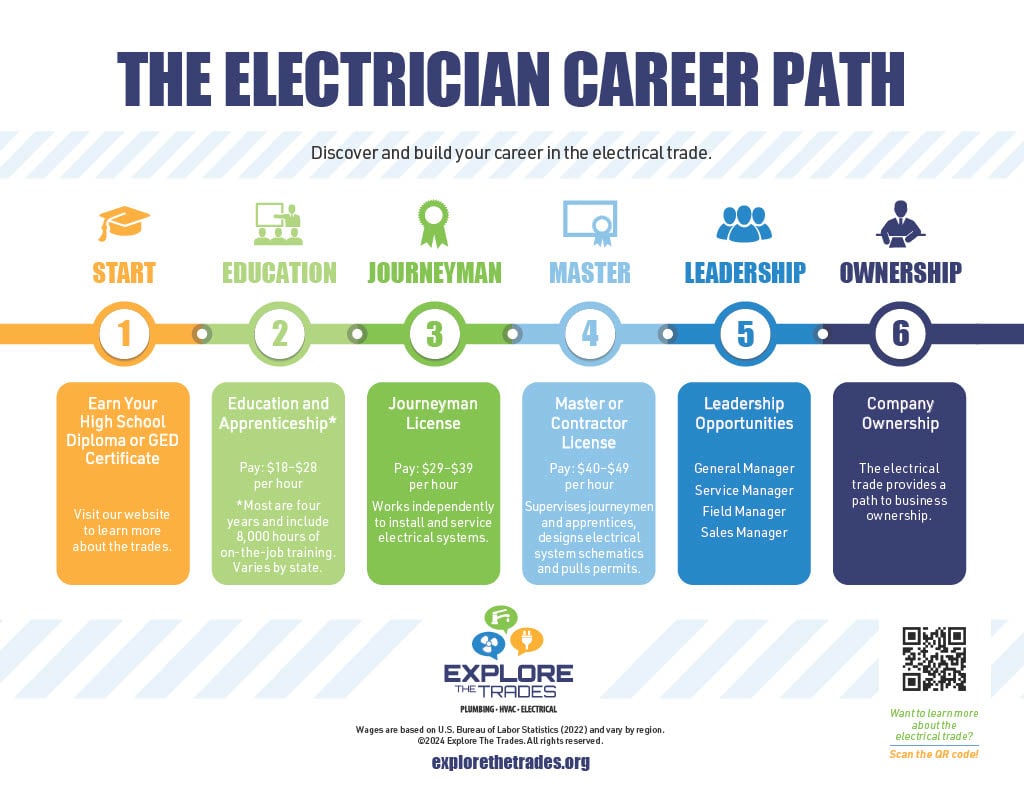To become an electrician, complete a vocational program and apprenticeship to gain skills and experience. Obtain certification for licensing.
Are you interested in pursuing a career as an electrician? This profession offers a rewarding path for individuals skilled in electrical work. Electricians are in high demand across various industries, from construction to maintenance. By following a structured path of vocational training and on-the-job experience, you can embark on a successful journey in this field.
Becoming an electrician requires dedication, technical knowledge, and a commitment to safety standards. In this blog, we will explore the steps involved in becoming a qualified electrician and the opportunities that await in this dynamic and essential trade.

Credit: www.trade-schools.net
The Spark Of Interest: Why Choose An Electrician Career?
Are you looking for a career that offers job security, growth opportunities, and a steady income? If so, becoming an electrician might just be the spark you need. In today’s digital age, the demand for skilled electricians continues to grow, making it a promising career choice. Let’s explore two compelling reasons why you should consider a career as an electrician.
Job Security And Demand
One of the primary reasons to pursue a career as an electrician is the job security it provides. In an ever-evolving world, the need for electricity is constant, and skilled electricians are essential to keep our homes, businesses, and infrastructure powered. Whether it’s installing electrical systems in new construction projects or troubleshooting and repairing existing ones, electricians play a vital role in ensuring the smooth functioning of our modern society.
With the increasing reliance on technology, the demand for qualified electricians is only expected to rise. As more homes, offices, and industries require electrical installations and upgrades, the job prospects for electricians remain high. This means that once you establish yourself as a skilled electrician, you can enjoy a stable career with plenty of opportunities to showcase your expertise.
Potential For Growth And Earnings
Aside from job security, a career as an electrician also offers significant potential for growth and earnings. As you gain experience and expertise in the field, you can take on more challenging projects and advance in your career. With additional training and certifications, you can specialize in areas like industrial electrical work, renewable energy systems, or home automation, opening up even more opportunities for advancement.
Moreover, electricians are often compensated well for their skills and knowledge. According to the Bureau of Labor Statistics, the median annual wage for electricians in the United States is around $56,180, with the top 10% earning more than $96,580. This income potential, combined with the steady demand for electricians, makes it a financially rewarding career choice.
In conclusion, choosing a career as an electrician can provide you with job security, ample growth opportunities, and a comfortable income. As technology continues to advance, the demand for skilled electricians will only increase, ensuring a promising future in this field. So, if you have a knack for problem-solving, enjoy working with your hands, and have a passion for electrical systems, consider pursuing a career as an electrician and light up your professional journey.
Basic Requirements: Starting Your Journey
Embarking on the path to become an electrician requires meeting certain basic requirements and starting your journey on the right foot. From educational pathways to essential skills, here’s what you need to know to kickstart your career in this dynamic and rewarding field.
Educational Pathways
When pursuing a career as an electrician, there are several educational pathways to consider. One common route is to complete a high school diploma or equivalent. This provides a solid foundation for further training in the electrical trade.
Additionally, many aspiring electricians opt to enroll in a vocational or technical school. These programs offer hands-on training and classroom instruction, providing a well-rounded education in electrical systems, circuits, and safety protocols.
Another pathway involves participating in an apprenticeship program. This allows individuals to learn on the job under the guidance of experienced electricians while also completing related classroom instruction. These programs typically last four to five years and provide valuable real-world experience.
Essential Skills For Success
In addition to formal education and training, there are essential skills that can contribute to success in the field of electrical work. Strong problem-solving abilities and critical thinking skills are crucial for troubleshooting electrical issues and devising effective solutions.
Furthermore, attention to detail is paramount when working with intricate electrical systems. This involves carefully following blueprints, schematics, and technical diagrams to ensure accurate installations and repairs.
Effective communication skills are also important, as electricians often collaborate with clients, colleagues, and other tradespeople on various projects. Being able to clearly convey technical information and project requirements is essential for successful outcomes.
Electrical Training: Laying The Groundwork
When embarking on the journey to become an electrician, the first step is to lay the groundwork through electrical training. Whether you choose a vocational school or an apprenticeship, the training programs are designed to equip you with the skills and knowledge necessary for a successful career in the electrical field.
Vocational Schools Vs. Apprenticeships
At vocational schools, aspiring electricians undergo structured classroom learning alongside hands-on practical training. These programs typically last between 6 months to 2 years, providing a comprehensive understanding of electrical systems, codes, and safety protocols.
On the other hand, apprenticeships offer a more hands-on approach, allowing individuals to learn directly from experienced electricians in a real-world setting. This on-the-job training is often complemented by classroom instruction, offering a balanced mix of practical experience and theoretical knowledge.
What To Expect From Training Programs
Electrical training programs cover a range of essential topics, including electrical theory, blueprint reading, circuitry, and safety procedures. Students also gain practical experience in installing, maintaining, and troubleshooting electrical systems. Additionally, training programs emphasize the importance of adhering to industry regulations and standards to ensure safe and efficient electrical work.

Credit: intercoast.edu
Apprenticeship: The Path Of Hands-on Learning
Embarking on an apprenticeship is the key to becoming a skilled electrician. This hands-on learning path provides practical experience essential for mastering the trade. Gain expertise by working alongside experienced professionals in the field.
Finding The Right Opportunity
When embarking on the journey to become an electrician, finding the right apprenticeship opportunity is crucial. An apprenticeship provides hands-on learning experiences that are essential for developing the practical skills and knowledge needed in this field. To find the right opportunity, follow these steps:
- Research local electrical contractors and companies in your area.
- Check if they offer apprenticeship programs or have partnerships with trade schools.
- Reach out to these organizations to inquire about available apprenticeship opportunities.
- Consider joining trade associations or unions that can provide resources and connections for apprenticeships.
- Attend job fairs and networking events to make connections with professionals in the electrical industry.
Maximizing Your Apprenticeship Experience
Once you have secured an apprenticeship, it’s important to make the most of this valuable learning opportunity. Here are some tips to maximize your apprenticeship experience:
- Be proactive and eager to learn from experienced electricians.
- Take notes and ask questions to deepen your understanding.
- Seek out opportunities to practice and refine your skills.
- Observe safety protocols at all times to protect yourself and others.
- Take advantage of any additional training or certifications offered during your apprenticeship.
- Build relationships with your mentors and fellow apprentices to expand your professional network.
Licensing And Certification: Navigating The Requirements
When pursuing a career as an electrician, navigating the licensing and certification requirements is crucial. Understanding the specific qualifications needed for state licensure and the national certifications worth pursuing can pave the way for a successful career in the electrical trade.
State-specific Licensing
Each state has its own set of requirements for electrician licensing. It’s essential to research the specific mandates in the state where you plan to work. Typically, the process involves completing an apprenticeship, passing an exam, and meeting certain educational requirements.
National Certifications Worth Considering
In addition to state licensure, pursuing national certifications can enhance an electrician’s credentials. The Electrical Training ALLIANCE, which offers the National Joint Apprenticeship and Training Committee (NJATC) certification, is highly regarded in the industry. Additionally, the International Brotherhood of Electrical Workers (IBEW) and the National Electrical Contractors Association (NECA) jointly sponsor the NJATC, providing valuable training and certification opportunities.
Specialization: Finding Your Niche
Discovering your niche as an electrician is crucial for success. Specializing in areas such as residential wiring, commercial installations, or renewable energy can set you apart in the industry. By honing your skills in a specific area, you can become an expert in high-demand electrical services.
Residential Vs. Commercial Electrician
Residential electricians focus on homes and apartments.
Commercial electricians work in offices, stores, and industrial buildings.
Emerging Fields And Technologies
New fields include renewable energy and smart home systems.
Technologies like solar panels and electric vehicles are growing.
Choosing a specialization is essential in the electrician field.
Career Advancement: Climbing The Electrical Ladder
When it comes to becoming an electrician, there are various opportunities for career advancement. Climbing the electrical ladder involves pursuing continuing education and potentially transitioning into management or owning a business.
Continuing Education
Staying updated with the latest industry trends and technologies is crucial for electricians. Continuing education courses help them enhance their skills and knowledge.
Transitioning Into Management Or Business Ownership
After gaining experience, some electricians may choose to move into management roles or even start their own electrical business. This shift allows for more responsibility and potential for growth.
Staying Safe On The Job: Essential Safety Practices
Staying safe on the job is crucial for electricians. By following essential safety practices such as wearing protective gear, using insulated tools, and properly grounding electrical systems, electricians can minimize the risk of accidents and ensure a secure working environment.
Understanding Electrical Hazards
Electricians must be aware of potential dangers of working with electricity.
Electric shocks and fires are common risks.
Best Practices For Injury Prevention
Wearing protective gear is crucial for safety.
- Safety glasses shield the eyes.
- Insulated gloves protect against shocks.
Regular equipment inspections are necessary to prevent accidents.

Credit: explorethetrades.org
Frequently Asked Questions
How Long Does It Take To Become An Electrician?
Becoming an electrician can take anywhere from 9 months to 5 years, depending on the training program you choose. An apprenticeship program typically takes 4-5 years, while a vocational school program can take 9 months to 2 years.
Do I Need A License To Become An Electrician?
Yes, you need a license to become an electrician. The requirements vary by state, but typically involve completing a training program, passing an exam, and meeting other criteria such as work experience and background checks.
What Kind Of Skills Do I Need To Become An Electrician?
To become an electrician, you need to have good manual dexterity, physical fitness, and the ability to work with complex electrical systems. You also need to be detail-oriented, safety-conscious, and able to solve problems effectively.
How Much Do Electricians Make?
Electricians can make a good living, with salaries ranging from $40,000 to $100,000 or more, depending on their level of experience and the industry they work in. The median salary for electricians is around $56,000 per year.
Conclusion
Becoming an electrician requires a combination of education, apprenticeship, and on-the-job training. It is a challenging yet rewarding career that offers job security and a strong earning potential. By following the steps outlined you can set yourself on the path to becoming a successful electrician.
Remember to stay committed, continue learning, and always prioritize safety. With dedication and hard work, you can achieve your goal of becoming a skilled electrician in the ever-growing field of electrical work.







